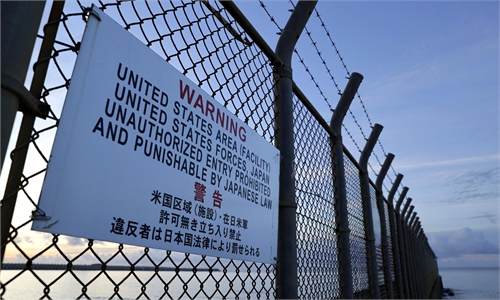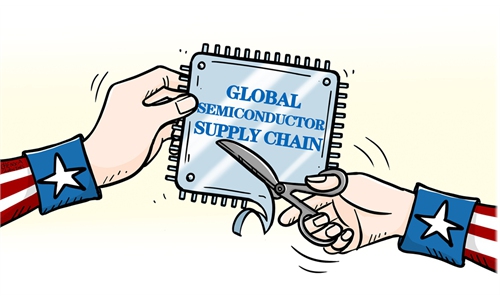
Illustration: Xia Qing/Global Times
At the beginning of the new year, rereading the autobiography Father, Son & Co: My Life at IBM and Beyond by Thomas Watson Jr., former president of IBM, I found new inspiration.Looking back at 2022, the US chip curbs on China were one of the biggest stories. According to US policymakers and some experts, this move will "suffocate" China's high-tech industries and ensure that the US wins its geopolitical competition. But for those who know more about China's experience and its current high-tech development, Washington's decision is nothing more than a sign of "high myopia."
Watson Jr.'s autobiography can help us understand more about the epochal competition ahead, and the only thing needed is a comparison or reference to the Chinese companies represented by Huawei and their growth environment.
Watson Jr. has been called "the greatest capitalist in history" by Fortune magazine, and his book has been called "one of the must-reads for entrepreneurs around the world." I'm sure those who made the decision to contain China, including US President Joe Biden, must have read it. However, they probably will not associate this book with the reasons for the rise of Chinese companies.
IBM's success has been mainly down to the following points: First, the technology transformation, through proactive innovation, to become the "leader" in the electronic computer industry. Second, large-scale investment in R&D and human resources. Third, through institutional reform, to achieve modern management. Fourth, keeping standing at the forefront of the market and technological development.
The last point, and also the most important, was to seize the opportunity of the Korean War (1950-53) and the Cold War between the US and the Soviet Union, and successfully achieve cooperation with the government, so as to get strong support. The first IBM computer development project was completed after the outbreak of the Korean War, according to the government's requirements.
IBM did not rely on foreign forces to achieve its own development, and there was no external force to seek help from at a time when other Western countries lagged behind the US in terms of technological development, and their industrial base and market size were even less than that of the US. IBM succeeded mainly by the strength of America's own industry and human resources, which was considered a self-reliance type of rise.
The most important thing to consider is not the personal ingenuity of Watson Jr. Americans like to exaggerate the role of the individual entrepreneur, just as they always like to promote individual heroism. In fact, the trend of the times, the development of the market, the improvement of education and the collaboration between government and business are the basic elements that have successfully bred leading American companies such as IBM.
If we compare these basic conditions for the rise of IBM with the growth process of China's leading high technology companies, such as Huawei, BYD, DJI, and etc., we will find that the reason for the rise of Chinese companies is also the progress of the whole country in all these areas. It can even be said that Chinese companies were better equipped than IBM was at the time.
Although China's high-end chip supply is now being choked off by the US, related industries are having growing difficulty attracting investment from top global companies, and Chinese companies are having increasing difficulty attracting top global talent. These same circumstances can be translated positively into a competitive effect, especially as it will further promote state-business cooperation.
China has the advantage that its industrial system today is larger, more technologically advanced, and more innovative than the US was back then, and that the Chinese market is the most dynamic and has the most growth potential in the world, and the global market is completely different from it was then, all of which can continue to play a role in the rise of Chinese high-tech companies.
We see in the US competitive strategy toward China that Washington's old tactics are being used in a new way, and the US is retrieving the policies of postwar industrial development, trying to promote the revival of US manufacturing through massive state support and intervention. The other side of this old trick is to join forces with allies to suppress and choke off the development possibilities of rivals.
China's decades of reform and opening-up has created and improved the conditions for companies to rise. As long as we stick to what has worked, rather than pursuing some iterative policy effect, more cities like Shenzhen will emerge, and thousands of companies will rise as successfully as Huawei, Tencent, and BYD.
This is the key to China's ability to successfully counteract the US crackdown on competition, and whether we can see the rapid diminishing effects of US sanctions in the coming year.
The author is a senior editor with People's Daily, and currently a senior fellow with the Chongyang Institute for Financial Studies at Renmin University of China. dinggang@globaltimes.com.cn. Follow him on Twitter @dinggangchina




